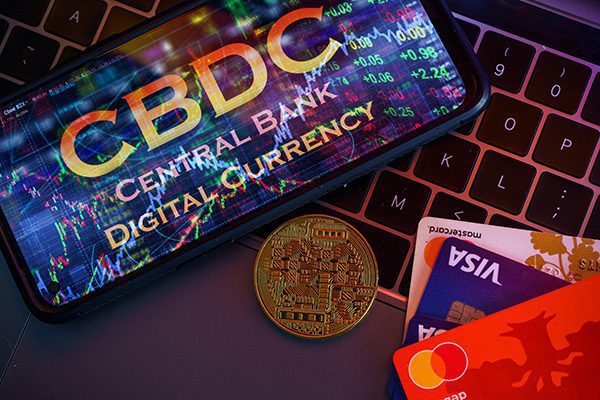
ARYZE’s Jack Nikogosian discusses how private sector stablecoin initiatives could be the key to stability and innovation in the current financial system.
Central Bank Digital Currencies (CBDCs) have been the subject of much debate recently. European Central Bank (ECB) chief Christine Lagarde asserted that central banks risk losing control of the financial system if they don’t develop their own digital currencies.
She said: “Where do we stand, we central bankers? We have been operating as a monetary anchor in relation to commercial banks and private money.
“If we are not in that game, if we are not involved in experimenting and innovating in terms of digital central bank money, we risk losing the role of anchor that we have played for many, many decades.”
While acknowledging the importance of innovation in digital finance, at ARYZE, we offer an alternative perspective, arguing that private sector stablecoin initiatives may provide a more viable solution.
ARYZE Denmark, through its wholly-owned and independent subsidiary ARYZE (BVI) Ltd, has recently launched a suite of digital cash stablecoins – eEUR, eGBP, and eUSD. ARYZE Digital Cash leverages the technical expertise of ARYZE ApS to issue secure and reliable full-reserve stablecoins.
This approach provides a secure and stable alternative to CBDCs, addressing the challenges facing traditional banking and the fractional reserve methodology at the heart of recent bank and stablecoin failures.
Lagarde’s concerns about trust in the banking system are valid, but we contend that issuing and controlling a central bank currency may not necessarily build the trust and stability she envisions.
Central banks should instead focus on facilitating private sector stablecoin initiatives, particularly those that are full reserve-based, such as the ARYZE digital cash suite. These stablecoins provide the trust and security of a CBDC while maintaining the agility of a crypto token and the freedom of cash.
Recent studies indicate that the public has little confidence in CBDCs, with concerns surrounding privacy and state control leading many citizens to reject the idea of adopting a central bank digital currency.
For example, in the United States, CBDCs have been highly politicised with fears of a ‘Biden coin’ and rumors of the ‘end of cash’. In addition, protests in Amsterdam have also emerged due to concerns about data privacy and state control.
We argue that increased regulation in the crypto space may not be the best approach, as it can struggle to keep pace with the rapidly evolving and innovative nature of digital assets. Instead, a more pragmatic view of regulation would foster innovation and allow the private sector to address the issues CBDCs aim to solve while gaining the acceptance and much-needed trust of the public they serve.
Finally, our full reserve banking model promotes financial inclusion for the unbanked and underbanked, providing access to reliable payments and stable assets that are fully resilient and predictable. We believe that our suite of stablecoins can contribute positively to the competitive landscape, driving innovation and offering a more efficient and secure solution than CBDCs.
In summary, central banks should focus on their existing mandates and avoid engaging in power grabs that may ultimately stifle innovation and create instability in the financial system. Instead, they should consider the benefits of private sector stablecoin initiatives and embrace the opportunities they present for a more inclusive and competitive financial system.

Jack Nikogosian is CEO and co-founder of ARYZE.
The Payments Association
St Clement’s House
27 Clements Lane
London EC4N 7AE
© Copyright 2024 The Payments Association. All Rights Reserved. The Payments Association is the trading name of Emerging Payments Ventures Limited.
Emerging Ventures Limited t/a The Payments Association; Registered in England and Wales, Company Number 06672728; VAT no. 938829859; Registered office address St. Clement’s House, 27 Clements Lane, London, England, EC4N 7AE.







Log in to access complimentary passes or discounts and access exclusive content as part of your membership. An auto-login link will be sent directly to your email.
We use an auto-login link to ensure optimum security for your members hub. Simply enter your professional work e-mail address into the input area and you’ll receive a link to directly access your account.
Instead of using passwords, we e-mail you a link to log in to the site. This allows us to automatically verify you and apply member benefits based on your e-mail domain name.
Please click the button below which relates to the issue you’re having.
Sometimes our e-mails end up in spam. Make sure to check your spam folder for e-mails from The Payments Association
Most modern e-mail clients now separate e-mails into different tabs. For example, Outlook has an “Other” tab, and Gmail has tabs for different types of e-mails, such as promotional.
For security reasons the link will expire after 60 minutes. Try submitting the login form again and wait a few seconds for the e-mail to arrive.
The link will only work one time – once it’s been clicked, the link won’t log you in again. Instead, you’ll need to go back to the login screen and generate a new link.
Make sure you’re clicking the link on the most recent e-mail that’s been sent to you. We recommend deleting the e-mail once you’ve clicked the link.
Some security systems will automatically click on links in e-mails to check for phishing, malware, viruses and other malicious threats. If these have been clicked, it won’t work when you try to click on the link.
For security reasons, e-mail address changes can only be complete by your Member Engagement Manager. Please contact the team directly for further help.